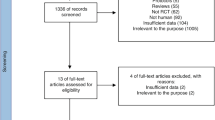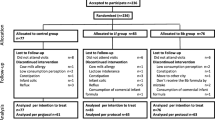Abstract
Fermented formulas, i.e., those fermented with lactic acid-producing bacteria during the production process and not containing significant amounts of viable bacteria in the final product, are widely available in many countries. Our aim was to systematically review published evidence related to the safety and health effects of the administration of fermented infant formulas compared with standard infant formulas. The Cochrane Library, MEDLINE, and EMBASE databases and major pediatric conference proceedings were searched. Five randomized controlled trials (RCTs) involving 1326 infants met the inclusion criteria. Compared with standard formula, the use of fermented formula resulted in a similar weight gain and length gain during the study period. Data from one RCT, albeit large, suggest the effectiveness of fermented formula in preventing and treating acute diarrhea. Fermented formula has the potential to reduce some, albeit not well-defined, digestive symptoms. Current evidence does not support the use of fermented formula for preventing cow’s milk allergy.
Conclusion: Limited available evidence suggests that the use of fermented infant formula, compared with the use of standard infant formula, does not offer clear additional benefits, although some benefit on gastrointestinal symptoms cannot be excluded.
What is known • Fermented formulas, i.e., those fermented with lactic acid-producing bacteria during the production process and not containing significant amounts of viable bacteria in the final product, are widely available in many countries. |
What is new • Limited evidence available suggests that the use of fermented infant formula, compared with the use of standard infant formula, does not offer clear additional benefits, although some benefit on gastrointestinal symptoms cannot be excluded. At the same time, no negative health effects have been documented. |

Similar content being viewed by others
Abbreviations
- BB C5:
-
Bifidobacterium breve C50
- BF:
-
Breastfed
- ESPGHAN:
-
European Society for Paediatric Gastroenterology, Hepatology and Nutrition
- FF:
-
Fermented formula
- GI:
-
Gastrointestinal
- IF:
-
Infant formula
- IF+:
-
Infant formula containing only a prebiotic mixture of short-chain galactooligosaccharides and long-chain fructooligosaccharides
- lcFOS:
-
Long-chain fructooligosaccharides
- LF15+:
-
Infant formula containing a prebiotic mixture of short-chain galactooligosaccharides and long-chain fructooligosaccharides and 15 % LactofidusTM
- LF50:
-
Infant formula containing only 50 % Lactofidus™
- LF50+:
-
Infant formula infant formula containing a prebiotic mixture of short-chain galactooligosaccharides and long-chain fructooligosaccharides and 50 % Lactofidus™
- PRISMA:
-
Preferred Reporting Items for Systematic Reviews and Meta-Analyses
- RCT:
-
Randomized controlled trial
- scGOS:
-
Short-chain galactooligosaccharides
- ST065:
-
Streptococcus thermophilus
References
Abrahamse E, Huybers S, Alles MS, Renes IB, Knol J, Bouritius H, Ludwig T (2015) Fermented infant formula increases ileal protein digestibility and reduces ileal proteolytic activity compared with standard and hydrolyzed infant formula in piglets. J Nutr
Agostoni C, Goulet O, Kolacek S, Koletzko B, Moreno L, Puntis J, Rigo J, Shamir R, Szajewska H, Turck D, ESPGHAN Committee on Nutrition (2007) Fermented infant formulae without live bacteria. J Pediatr Gastroenterol Nutr 44:392–397
Billeaud C, Guillet J, Sandler B (1990) Gastric emptying in infants with or without gastro-oesophageal reflux according to the type of milk. Eur J Clin Nutr 44:577–583
Boudraa G, Boukhrelda M, deLempdes JBR, Blareau JP, Touhami M (1994) Effect of fermented infant formula on incidence of diarrhea at early weaning. J Pediatr Gastroenterol Nutr 19:339
Braegger C, Chmielewska A, Decsi T, Kolacek S, Mihatsch W, Moreno L, Pieścik M, Puntis J, Shamir R, Szajewska H, Turck D, Van Goudoever J, ESPGHAN Committee on Nutrition (2011) Supplementation of infant formula with probiotics and/or prebiotics: a systematic review and comment by the ESPGHAN committee on nutrition. J Pediatr Gastroenterol Nutr 52:238–250
Brunser O, Araya M, Espinoza J, Guesry PR, Secretin MC, Pacheco I (1989) Effect of an acidified milk on diarrhoea and the carrier state in infants of low socio-economic stratum. Acta Paediatr Scand 78:259–264
Campeotto F, Butel MJ, Kalach N, Derrieux S, Aubert-Jacquin C, Barbot L, Francoual C, Dupont C, Kapel N (2004) High faecal calprotectin concentrations in newborn infants. Arch Dis Child Fetal Neonatal Ed 89:F353–355
Campeotto F, Suau A, Kapel N, Magne F, Viallon V, Ferraris L, Waligora-Dupriet AJ, Soulaines P, Leroux B, Kalach N, Dupont C, Butel MJ (2011) A fermented formula in pre-term infants: clinical tolerance, gut microbiota, down-regulation of faecal calprotectin and up-regulation of faecal secretory IgA. Br J Nutr 105:1843–1851
Codex Alimentarius, Codex Committee on Milk and Milk Products, Codex Standard for Fermented Milks (CODEX STAN 243–2003) (2010) http://ftp.fao.org/codex/Reports/Alinorm10/al33_11e.pdf
Codex Alimentarius, Milk and Milk Products, second edition (2011) http://www.fao.org/docrep/015/i2085e/i2085e00.pdf
Gadellaa M. Fermented infant formula with prebiotics study. Nederland Trial Register NTR 2521 http://www.trialregister.nl/trialreg/admin/rctview.asp?TC=2521
Garcette K, Bellaiche M (2007) Serena questionnaire: course of functional disturbances and quality of life of suckling infants on Bledilait 1. Med Enfance 27:3–7
Granier A, Goulet O, Hoarau C (2013) Fermentation products: immunological effects on human and animal models. Pediatr Res 74:238–244
Higgins JPT, Green S (2011) Cochrane Handbook for Systematic Reviews of Interventions Version 5.1.0., Available from www.cochrane-handbook.org
Hill C, Guarner F, Reid G, Gibson GR, Merenstein DJ, Pot B, Morelli L, Canani RB, Flint HJ, Salminen S, Calder PC, Sanders ME (2014) The International Scientific Association for Probiotics and Prebiotics consensus statement on the scope and appropriate use of the term probiotic. Nat Rev Gastroenterol Hepatol 11:506–514
Indrio F, Ladisa G, Mautone A, Montagna O (2007) Effect of a fermented formula on thymus size and stool pH in healthy term infants. Pediatr Res 62:98–100
Moher D, Liberati A, Tetzlaff J, Altman DG, The PRISMA Group (2009) Preferred reporting items for systematic reviews and meta-analyses: the PRISMA statement. PLoS Med. doi:10.1371/journal.pmed.1000097
Morisset M, Aubert-Jacquin C, Soulaines P, Moneret-Vautrin DA, Dupont C (2011) A non-hydrolyzed, fermented milk formula reduces digestive and respiratory events in infants at high risk of allergy. Eur J Clin Nutr 65:175–183
Mullié C, Yazourh A, Thibault H, Odou MF, Singer E, Kalach N, Kremp O, Romond MB (2004) Increased poliovirus-specific intestinal antibody response coincides with promotion of Bifidobacterium longum-infantis and Bifidobacterium breve in infants: randomized, double-blind, placebo-controlled trial. Pediatr Res 56:791–795
Ortiz-Andrellucchi A, Sánchez-Villegas A, Rodríguez-Gallego C, Lemes A, Molero T, Soria A, Peña-Quintana L, Santana M, Ramírez O, García J, Cabrera F, Cobo J, Serra-Majem L (2008) Immunomodulatory effects of the intake of fermented milk with Lactobacillus casei DN114001 in lactating mothers and their children. Br J Nutr 100:834–845
Romond M, Cauchie C, Dessaint I, Aubert-Jacquin C, Kalach N (2009) Fermented infant formula without live bacteria tends to mimic effect of breast-feeding on intestinal microbiota in weaning babies. J Pediatr Gatrpoenterol Nutr 48:E9
Roy P, Aubert-Jacquin C, Avart C, Gontier C (2004) Benefits of a thickened infant formula with lactase activity in the management of benign digestive disorders in newborns. Arch Pediatr 11:1546–1554
Thibault H, Aubert- Jacquin C, Goulet O (2004) Effects of long-term consumption of a fermented infant formula (with Bifidobacterium breve c50 and Streptococcus thermophilus 065) on acute diarrhea in healthy infants. J Pediatr Gastroenterol Nutr 39:147–152
Tormo Carnicer R, Infante Piña D, Roselló Mayans E, Bartolomé Comas R (2006) Intake of fermented milk containing Lactobacillus casei DN-114 001 and its effect on gut flora. An Pediatr 65:448–453
van de Heijning BJ, Berton A, Bouritius H, Goulet O (2014) GI symptoms in infants are a potential target for fermented infant milk formulae: a review. Nutrients 6:3942–3967
Vandenplas Y, Hourihane J, Bouritius H (2013) Newly-developed fermented infant formulas, combining scGOS/lcFOS with LactofidusTM, show equivalence of weight gain in healthy infants: a randomized, controlled, double-blind, multicenter, intervention study. http://2013.eapcongress.com/wp-content/uploads/2014/01/Gastroenterology-Nutrition_21-September.pdf
Vandenplas Y, Ludwig T, Bouritius H, Hourihane J, Huet F (2014) The combination of Scgos/lcfos with fermented infant formula reduces the incidence of colic in 4 week old infants. Arch Dis Child 99:A91–A92
Authors’ contributions
HS conceptualized the study. All authors contributed to the design of the study and read and approved the manuscript. All authors contributed to the development of the first and the final draft of the manuscript.
Discussed under Ethical Approval
ᅟ
Funding
There was no funding for this review.
Conflict of interest
HS has served as a speaker for Danone and Nutricia. AS and MPL declare no conflict of interest.
Ethical Approval
This article does not contain any studies with human participants or animals performed by any of the authors.
Author information
Authors and Affiliations
Corresponding author
Additional information
Communicated by Peter de Winter
Electronic supplementary material
Below is the link to the electronic supplementary material.
ESM 1
(DOC 162 kb)
Rights and permissions
About this article
Cite this article
Szajewska, H., Skórka, A. & Pieścik-Lech, M. Fermented infant formulas without live bacteria: a systematic review. Eur J Pediatr 174, 1413–1420 (2015). https://doi.org/10.1007/s00431-015-2629-y
Received:
Revised:
Accepted:
Published:
Issue Date:
DOI: https://doi.org/10.1007/s00431-015-2629-y




